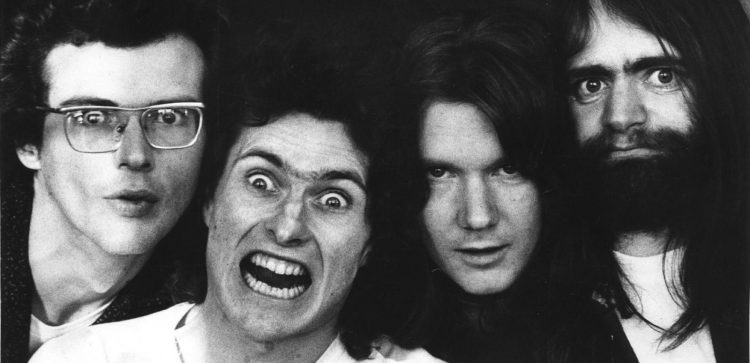New book documents when Daddy Cool were red hot

A new book on ‘70s phenomenon Daddy Cool, Daddy Who? was launched at Arts Centre Melbourne yesterday.
With a mix of doo-wop and blues rock, Ross Wilson, the late Ross Hannaford, the late Wayne Duncan and Gary Young, emerged in 1970 and proceeded to destroy sales records for Australian acts while crowds went berserk forming spontaneous conga lines and swarming the stage.
Their debut single Eagle Rock (May, 1971) stayed at #1 for 10 weeks while Daddy Who? Daddy Cool (recorded in two and a half days) was the first local album to break the 100,000 mark.
That record was broken a few years later by Skyhooks’ Living In The ‘70s which was produced by DC’s Wilson.
Within just 18 months they issued a Top 10 follow up Sex, Dope, Rock’n’Roll: Teenage Heaven, hailed by Elton John and Alice Cooper, toured America three times and broke up at their peak because success was affecting the music.
Craig Horne, author of Daddy Who? recollects, “The Daddy Cool legacy is profound, they provided the soundtrack for a generation.
“Daddy Cool hit on the eve of the Whitlam era, the White Australia policy was dead, we had cut our British apron strings and a real Australian cultural renaissance was underway in film, theatre, literature art and music.
“Daddy Cool were at the vanguard of that cultural emergence.”
Horne is a musician who picked up the guitar after seeing a DC show and later ended up enlisting three of its former members to his band.
From this ringside view, he provides insight into the eccentricities and unconventional rock lifestyles which generated the irresistible spark of the music.
He also details their early paths and the state of the music industry at the time.
Wilson and Hannaford started playing in bands in their early teens; had already become famous when The Party Machine‘s songbook was confiscated by the vice squad.
Daddy Who? unearths some interesting anecdotes.
The band was not named after the 1957; Wilson put two hip words together and only later incorporated the song into their set when people told him about it.
A 15-year-old Nicole Kidman made her screen debut on the video for Bop Girl, which Wilson produced for his wife Pat.
Wilson and Young were still doing 9—5 jobs packing books in a warehouse when Eagle Rock was released.
It came on the radio at the factory, and the cheer with which the other workers greeted the opening riff led them to realise something huge was happening. They quit their jobs immediately to focus on the band.
Daddy Cool got banned from the Melbourne Town Hall when the audience rioted: 20 years later, the lord mayor sent the band a (joke) bill for $21,000.
Horne recalls to TMN about another crazy gig, at an Adelaide University break up party and at which the band had dropped acid the night before.
Through the show Wilson “was communicating in pure Martian”, he says.
“Unfortunately, the proceeds from the previous nights’ gig was in a shoulder bag slung across his chest; imbued with the spirit of brotherly love – Ross began diving into the bag, pulling out handfuls of cash and throwing it into the crowd.
“The band had never seen Ross Hannaford move so fast; in seconds he was down on the dance floor scooping up every bit of money he could lay his hands on.
“But all was not lost, later that night someone from the organising committee came backstage with a huge pile of notes retrieved from the gig… It was truly a time of peace and love!”
Crazy days indeed.
* Daddy Who? by Craig Horne is out through Melbourne Books.


































